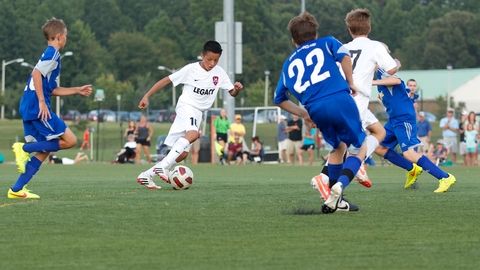
I’ve no doubt we’ve all been there.
Whether you’re a coach, volunteer or parent of a grassroots football player, the chances are you’ve had to pick them up following a disappointment.
It could be that they’ve been dropped from a team, made a mistake that cost a goal, lost an important match or missed a penalty, one recurring theme of football is that it knocks you down and it waits to see if you can get back up again.
Of course, this is yet another way that participation in grassroots football helps to provide important life lessons and mental resilience is somewhere near the top of the list.

In the often demanding world of junior football, mental resilience is a vital attribute that can make the difference between success and setback.
From overcoming performance anxiety to bouncing back from those down days, it’s important to support young players to thrive both on and off the pitch.
As a parent of a young footballer in particular I’m all too familiar with the mental challenges the game can present.
For instance, many young players experience performance anxiety, which can manifest as nervousness, self-doubt, and fear of failure.
Performance anxiety can be a self-fulfilling prophecy that impairs performance and undermines confidence, making it essential to develop strategies for managing and overcoming it.
Setbacks are an inevitable part of football and life, but they can be difficult for young players to navigate.
Whether it's losing a match, missing a penalty, or being dropped from the team, setbacks can shake confidence and test resilience.
Additionally, we sometimes don’t help our young players by loading them with pressure to perform.
This can come from various sources, including coaches, parents, teammates, and their own expectations.

Learning to cope with pressure and perform under stress is a crucial skill for success in football and beyond.
Mental resilience is a multifaceted psychological attribute that plays a fundamental role in the development and success of young football players.
It encompasses a spectrum of skills, attitudes, and behaviours that enable individuals to adapt, persevere and thrive in the face of adversity.
At its heart lies the ability to adapt and adjust to changing circumstances, both on and off the pitch.
Our young footballers must be able to navigate the unpredictable nature of the game, respond to different demands and overcome unexpected challenges with composure and flexibility.
Adaptability allows players to remain focused on making progress, enhancing their performance and decision making under pressure.
We know that setbacks are an inevitable part of football, this game kicks you down like few other things sometimes, but resilient individuals possess the capacity to bounce back from disappointments, defeats and failures.
We must help our young players to view setbacks as learning opportunities rather than insurmountable obstacles, cultivating a mindset that values growth and development.
If they can respond to challenges and setbacks with effort, perseverance, and resilience in the face of adversity, it will help them to achieve both with their football and beyond.
By reframing setbacks as temporary glitches on the path to success, players can maintain motivation, confidence and belief in their abilities.
Even at grassroots level football is a high pressure sport that places demands on players to perform consistently at their best, often under intense scrutiny and expectation.
Mental resilience enables young footballers to cope with pressure, manage stress and maintain focus and concentration amidst distractions and external pressures.
Techniques such as mindfulness, deep breathing andvisualisation can help players regulate their emotions, stay present in the moment and perform well, even when they feel pressure.
Self-confidence is a cornerstone of mental resilience, empowering young footballers to trust in their abilities, make positive decisions and express themselves on the pitch.
Belief in themselves is essential for overcoming self-doubt and fear of failure, supporting a sense of empowerment that fuels motivation and resilience.
Coaches play a crucial role in nurturing a player’s self-confidence through positive reinforcement, encouragement and constructive feedback that reinforces their strengths and achievements.
Emotion regulation is another key component of mental resilience, enabling young footballers to manage and channel their emotions effectively in challenging situations.
The last thing anybody needs are players storming off the pitch or losing control.
Players must learn to regulate intense emotions such as frustration, anger and anxiety which can negatively impact performance and their decision making on the pitch.
Techniques such as mental relaxation exercises and broader goal setting can help players maintain emotional balance and composure, even in the heat of a competitive situation.
Perseverance and grit are essential qualities that underpin mental resilience, driving young footballers to persist in the face of adversity and setbacks.
Players need to develop a strong work ethic and determination to overcome challenges to pursue their goals with as much passion as they can.
By embracing challenges as opportunities for growth and development, players can cultivate a mindset of resilience and tenacity that fuels long-term success in football and beyond.
Dr.Emma Johnson is a renowned sports psychologist with extensive experience working with young athletes.
She emphasises the importance of mental resilience in youth sport and shares practical strategies for developing resilience in young players:
"In my work with young athletes, I've seen first-hand the impact that mental resilience can have on performance and wellbeing.Building resilience is not about eliminating challenges or setbacks but equipping players with the psychological skills to navigate adversity effectively.One key strategy is reframing setbacks as opportunities for growth and learning. Encouraging players to adopt a growth mindset and view setbacks as temporary obstacles on the path to success can help them bounce back stronger and more resilient."
She also highlights the role of self-awareness and mindfulness in developing mental resilience, "Selfawareness is another crucial aspect of mental resilience. Encouraging young players to reflect on their thoughts, emotions and reactions to different situations can help them develop insight into their strengths and areas for growth.”
Mark Thompson has over 20 years of experience coaching youth football teams at a variety of levels.
He too shares believes in the importance of building mental resilience in young players.
"In my experience, mental resilience is just as important as technical ability and physical fitness in youth football.I believe in creating a supportive and positive learning environment where players feel empowered to take risks, make mistakes and learn from their failures.Developing resilience is a gradual process that requires patience and persistence from both players and coaches."
We know that building mental resilience is essential for young footballers to thrive in the challenging world of junior football.
By understanding their challenges, implementing practical strategies and seeking support from those around them, young players can develop the mental resilience needed to overcome obstacles, perform at their best and reach their full potential both on and off the pitch.

















